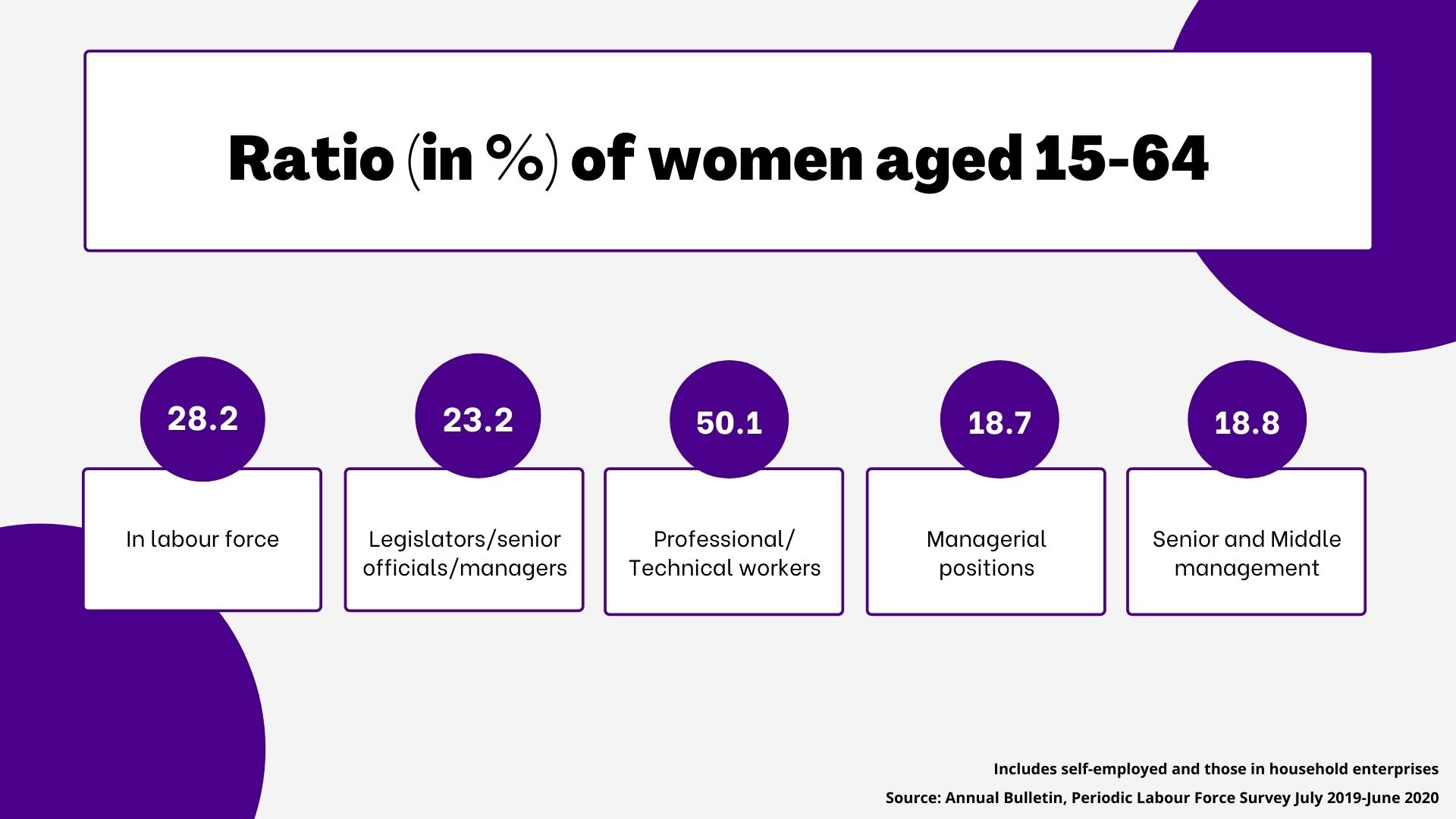Indian women less affected by toxic Instagram
Good Morning! A big hello to readers who signed up this week. This is The Signal’s weekend edition. Our story today is on the declining proportion of women in workplaces and its impact on data and data-driven applications. Also in today’s edition: the best reads from the week. Happy weekend reading. A few days ago, the Wall Street Journal published Facebook’s internal documents which revealed that its photo-sharing platform Instagram triggered toxic social comparison. Hidden in the report — based on Facebook’s own 100,000-person survey across nine tech-savvy nations of the world — was an interesting nugget on India. While in other nations this social comparison was worse for women, it was men who had it worse in India. And that’s not because Instagram is any less toxic for young women here. Facebook researchers found the women in India formed a small proportion of the workforce and did not have varied life experiences or social circles — perks of jobs and professional settings — to compare themselves with. They simply didn’t have enough stories to share. The researchers traveled to the country in 2019 to do in-person interviews to dive deeper. After all, Facebook and Instagram have the largest number of users in India at 340 million and 180 million respectively. They found that personal and financial independence and success were key factors in the variation. “In the countries where men experience more comparison, women generally comprise a smaller proportion of the paid workforce,” the researchers wrote. We know that over the years, the sex ratio in India has been improving though it is still very much skewed in favour of males. What is less known is that the sex ratio of the young population has been sliding since 1991. A study, Youth in India, by the Central Statistics Office forecast it to reach 904 in 2021 and 898 in 2031. We also know that employers have been talking a lot about improving gender equality. But data shows otherwise. Not only is it not looking good, but it is also getting worse. Government data released in September shows that the proportion of women working in managerial positions in India is below 19%. Even in cities and towns where opportunities and freedom to work are more compared to villages, there are few — just over 21% — women managers. The gender skew permeates new businesses as well. Only five out of 136 unicorn founders in India are women. Not only is the ratio of working women low in India, but it is also among the countries where the share is falling. The World Economic Forum’s Gender Gap Index for 2021 ranked India at 140 out of 156 countries, a fall by 28 notches. Women were about 43% of India’s workforce in 1993-94. That dropped to just above 31% by 2011-12. The World Bank estimated that more than 20 million women stopped working between 2004-05 and 2011-12 alone. India was the lowest-ranked among South Asian nations and the only nations that were ranked lower globally were the Arab countries. Fewer women at workplaces and in decision-making roles means social and economic power will remain imbalanced, influencing the design of new products, services, policies, and institutions to suit the tastes and preferences of men. The absence of women presents twin technology-related problems because systems and algorithms depend on data. First, the skew may be reinforced as more and more companies deploy artificial intelligence and machine learning to humanize bots that interact with humans. They are struggling to deal with real-world biases creeping into machines as is seen in AI bots and voice assistants such as Amazon’s Alexa and Apple’s Siri. For instance, a 2020 study found that one in four people in the UK felt men had dibs on a job and thought men made better business executives than women did. In India, that figure was 69%. If there are not enough women, data will also be inadequate. Second, automation and Covid-19 will reduce the overall number of existing jobs, putting women at a disadvantage as more available jobs are likely to go to men. More men are also likely to return to workplaces than women will, as work from home becomes a post-pandemic norm. That will create a further shortage of relevant data. The Facebook researchers noted that although body concerns are relatively low in India compared to other countries, appearance comparison is still high. “We need to understand appearance-based content shared in India better and its impact on viewers,” they said. That cannot happen without better data from more women. Sponsored By CTQCompoundsEver thought of rediscovering your reading habit? Or feared that your skills might become obsolete in a fast-changing world? As a bonus, our readers get ₹2,500 off on the subscriptions (using the links above). ICYMIZuckerberg’s Autocracy: His favourites are spared from content moderation rules, he has suppressed research on the mental health impact of Instagram and also has failed to nip political bias. This piece by The Atlantic says that Facebook and Mark Zuckerbeg’’s powers are far from being democratic and that it is slowly ‘poisoning’ the world. Woman Power: “Leave that crown in the garage” is former PepsiCo CEO Indra Nooyi’s message to working women. In her memoir My Life In Full, Nooyi talks about navigating the professional work setting in the 1980s and 90s, lessons from her job, staying grounded, and work-life balance during her CEO days. ‘Type’--ical Love: Typewriters are still considered the best equipment to learn typing because you cannot correct errors like in digital technology. While many sounded the death knell of this device as computers arrived, this BBC story chronicles how small towns and metropolitan areas in India are keeping the manual typewriters alive. Crazy Ozy: Imagine a company COO impersonating a YouTube official to get an investment from Goldman Sachs. This New York Times deep-dive on Ozy Media showcases the series of lies and deceit by the firm to present a rosy picture. Now, Ozy has termed this as a period of ‘mental health crisis’ for COO Samir Rao. CIA vs WikiLeaks: Senior CIA officials had made plans to kidnap and kill WikiLeaks founder Julian Assange. An investigative report by Yahoo News said that the CIA under Mike Pompeo was troubled by Assange’s leaks on their hacking tools and wanted to abduct him. Members of former US President Donald Trump’s administration colluded too. Beverly Hills’ charisma: Prince Harry and Meghan Markle who quit royal duties in the UK to move to California, United States are now chasing the Hollywood dream. After the explosive interview with Oprah Winfrey followed by a multi-year Netflix deal and podcast opportunities, the Duke and Duchess seemed to have finally arrived in Tinseltown. If you liked this post from The Signal, why not share it? |
Older messages
Nintendo’s stuck in HD
Friday, October 1, 2021
Also in today's edition: Some more rich men, Google gets some context, Retailers all in on Diwali
Oh America
Thursday, September 30, 2021
Also in today's edition: Amazon's kooky gadgets, The many shapes of Metaverse, Oyo IPO may get stuck.
Who has Swiggy gotten in bed with?
Wednesday, September 29, 2021
Also in today's edition: Adani enters e-commerce, Brexit from Britain, TikTok is a user unicorn.
India needs chips. Bad.
Tuesday, September 28, 2021
Also in today's edition: Festival face-off, Gig work pays but scares, Pet boost to the economy.
Who is Facebook's Marlboro Man?
Monday, September 27, 2021
Also in today's edition: Power cut in China, Google spies on staff, Quad is about vaccine now
You Might Also Like
The Gratitude Shift: From 'Grateful For' to 'Grateful In'
Wednesday, November 27, 2024
For many of us, 2024 has been a year of extremes. The highs have felt exhilarating, and the lows have been profoundly difficult.
Short Video 101
Wednesday, November 27, 2024
It's as easy as 1, 2, 3.
⏰ Black Friday Countdown: 2 Days to Go!
Wednesday, November 27, 2024
Alert: Incoming Savings!
Google uses search remedies trial to subpoena OpenAI, Perplexity and Microsoft over their generative AI efforts
Wednesday, November 27, 2024
In an attempt to show AI has created a more competitive search industry, Google is trying to get OpenAI, Perplexity AI, and Microsoft's strategies to defend its own. November 27, 2024 PRESENTED BY
🔔Opening Bell Daily: US exceptionalism
Wednesday, November 27, 2024
The classic advice to diversify with international stocks has become a losing strategy for portfolio managers.
How this founder scaled to $4.6M ARR and a 13x revenue exit!
Wednesday, November 27, 2024
Let's break it down!
MAILBAG! FCS Bowl Games, FBS regular season expansion, and more:
Wednesday, November 27, 2024
Plus, EVEN MORE EXTRA POINTS BOWL PICTURES
Into the black
Wednesday, November 27, 2024
Offshore crypto-gambling is having a moment ͏ ͏ ͏ ͏ ͏ ͏ ͏ ͏ ͏ ͏ ͏ ͏ ͏ ͏ ͏ ͏ ͏ ͏ ͏ ͏ ͏ ͏ ͏ ͏ ͏ ͏ ͏ ͏ ͏ ͏ ͏ ͏ ͏ ͏ ͏ ͏ ͏ ͏ ͏ ͏ ͏ ͏ ͏ ͏ ͏ ͏ ͏ ͏ ͏ ͏ ͏ ͏ ͏ ͏ ͏ ͏ ͏ ͏ ͏ ͏ ͏ ͏ ͏ ͏ ͏ ͏ ͏ ͏ ͏ ͏ ͏ ͏ ͏ ͏ ͏ ͏ ͏ ͏ ͏
1 minute to increase your email open rate
Wednesday, November 27, 2024
Every year we bring the highest quality software to RocketHub for an insane BFCM event. This year is no different! BFCM starts now so check the page below for one new lifetime deeaaal drop each day.
Memo: The Distressed Brand
Wednesday, November 27, 2024
The opposite of brand equity isn't no equity; it's brand apathy. View this email in your browser 2PM (No. 1014). The most recent letter was read by 46.1% of subscribers and this was the top




